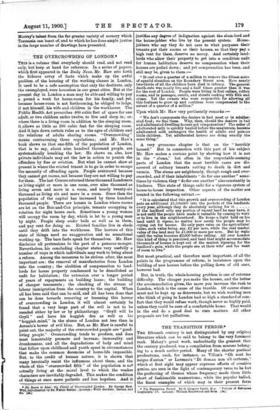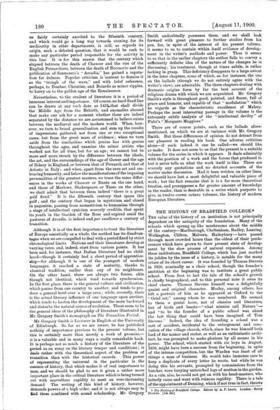THE TRANSITION PERIOD.*
THE fifteenth century is not distinguished by any original literature which can be said to belong to the very foremost rank. Malory's great work, undoubtedly the greatest that the century produced, was a compilation from sources belong- ing to a much earlier period. Many of the shorter poetical productions, such, for instance, as Villon's "Oh sont lee neiges d'antan " or Lorenzo's "Di doman non c'e certezza," which at first sight may appear supreme efforts of creative genius, are seen in the light of contemporary verse to be but the perfecting of themes whose frequency made them little short of fashionable mannerisms; while the popular ballad, the finest examples of which may in their present form • The Transition Period. By G. Gregory Smith, MA. "Periods of European Liuirature," IV. London William Blackwood and Bona. go.] be fairly certainly ascribed to the fifteenth century, and which would go a long way towards atoning for its mediocrity in other departments, is still, as regards its origin, such a debated question, that it would be rash to make any particular period responsible for the activity in this line. It is for this reason that the century which elapsed between the death of Chaucer and the rise of the English Petrarchists, between the death of Boccaccio and the publication of Sannazaro's "Arcadia," has gained a reputa- tion for dulness. Popular criticism is 'oontent to dismiss it as the "trough of the wave," and with brief reference, perhaps, to .Dunbar, Christine, and Boiardo as minor ripples, to hurry on to the golden age of the Renaissance.
Nevertheless, to the student of literature it is a period of immense interest and importance. Of course, no hard fixed line can be drawn at any such date as 1453,that shall divide the Middle Age from the Rebirth, and anomalies abound that make one ask for a moment whether these are indeed separated by the distance we are accustomed to believe exists between the mediwval and the modern world. When, how- ever, we turn to broad generalisation and sum up the results of impressions gathered, not from one or two exceptional cases, but from the great mass of evidence ; when we turn aside from the similarities which genius has with genius throughout the ages, and examine the minor artists who worked not for all time, but for an age; we cannot but be more and more struck by the difference between the ideals, the art, and the surroundings of the age of Gower and the age of Sidney in England, or between that of Petrarch and that of Ariosto in Italy; and when, apart from the sure art and em- bracing humanity, and below the manifestations of the imposing personalities of the greatest masters, we trace the same differ- ences in the works of Chaucer or Dante on the one hand, and those of Marlowe, Shakespeare, or Tasso on the other, we shall admit that between them indeed "there is a great gulf fixed." It is the fifteenth century that spans this gulf; and the century that began in mysticism and closed in paganism, passing from monasticism to humanism through a stage of intellectual cynicism scarcely credible, that spent its youth in the Garden of the Rose and expired amid the pastures of Arcadia, is indeed and par excellence a century of transition.
Although it is of the first importance to treat the literature of Europe essentially as a whole, the method has its disadvan- tages when we are compelled to deal with a period fixed by strict chronological limits. Nations and their literatures develop at varying rates, and, indeed, start from various points. It has been said, for instance, that Italian literature had no child- hood—though it certainly had a short period of apprentice- ship—for although it is one of the youngest of modern languages, it reached a state of maturity, thanks to classical tradition, earlier than any of its neighbours. On the other hand, there are always two forces, akin though not identical, which tend towards synchronism. In the first place, there is the general culture and civilisation, which passes from one country to another, and tends to pro- duce a general level over a large area ; while, secondly, there is the actual literary influence of one language upon another, which tends to hasten the development of the more backward and disturbs the natural course of evolution. These seem to be the general ideas of the philosophy of literature illustrated in Mr. Gregory Smith's monograph on The Transition Period.
Mr. Gregory Smith is Lecturer in English at the University of Edinburgh. So far as we are aware, he has published nothirig of importance previous to the present volume, but this is certainly more than merely a work of promise,— it is a valuable and in many ways a really remarkable book. It is perhaps not so much a history of the literature of the period as an essay on the literary temper and conditions ; it deals rather with the theoretical aspect of the problem of transition than with the historical records. This power of representing the universal in the particular is the essence of history, that which makes it of real importance to man, and we should be glad to see it given a rather more important place in the critical literature which is being turned out with marvellous rapidity to meet an ever-increasing demand. The writing of this kind of history, however, demands powers a a high order, and it is not always easy to find these combined with sound scholarship. Mr. Gregory Fowde use.ed.]
Smith undoubtedly possesses them, and we shall look forward with great pleasure - to further studies from his pen, for, in spite of the interest of his present volume, it seems to us to contain within itself evidence of develop- ment in the writer's methods and power. Thus it seems to us that in the earlier chapters the author fails to convey a sufficiently definite idea of the nature of the changes he is discussing ; his treatment, though at times subtle, is rather lacking in grasp. This deficiency disappears to a large extent in the later chapters, some of which, as, for instance, the one on the ballads (though we do not entirely agree with the writer's view), are admirable. The three chapters dealing with dramatic origins form by far the best account of the religious drama with which we are acquainted. Mr. Gregory Smith's style is throughout good, pointed, and fluent, full of grace and humour, and capable of that " modulation" which he regards as the characteristic excellence of Makry. Perhaps the most interesting passage in the volume is the extremely subtle analysis of the "intellectual devilry" of Puki's " Morgante Maggiore."
There are of course points, such as the ballads afore- mentioned, on which we are at variance with Mr. Gregory Smith. But these differences of opinion do not detract from our pleasure in reading his book. One adverse criticism alone—if such indeed it can be called—we should like to make. It does not seem to us that the present is a suitable volume for the series in which it appears. It deals admirably with the position of a work and the forces that produced it, but it never tells us what the work itself is like. There are scarcely any quotations and no detailed accounts of the matter under discussion. Had it been written on other lines, we should have lost a most delightful and valuable piece of wotk ; but the fact remains that it is a far more theoretical treatise, and presupposes a far greater amount of knowledge in the reader, than is desirable in a series which purports to give, in twelve crown octavo volumes, the history of modern European literature.
•



































 Previous page
Previous page